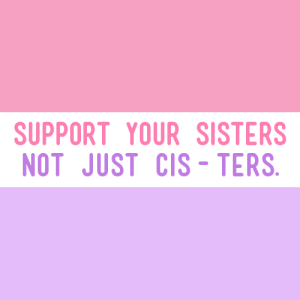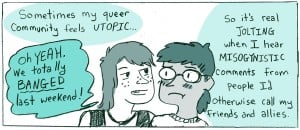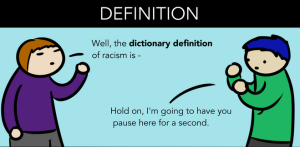Hey, y’all. This is another video I’m doing in a series with Everyday Feminism, which you probably know is a website dedicated to helping you breakdown and stand up to everyday oppression. In this video, I want to talk to the white people in my audience. I want to talk about something that we tend to do a lot.
It’s not uncommon in the social justice community to hear, “I didn’t know” in response to being called out on racist behavior. White people, including myself sometimes, have a tendency to claim ignorance when we’re confronted with the uncomfortable truth that we have a great deal of racial privilege, and what we do and say can be harmful, even without bad intentions.
This is, no doubt, frustrating for people of color who are constantly confronted with white people claiming ignorance. It’s almost as if it serves white comfort and white dominance to remain ignorant, to avoid stirring up the pot enough to shake us from our place in the hierarchy.
White people, I think it’s time to stop saying “I didn’t know” as if it absolves us. White ignorance is something that we all need to better understand in order to move forward toward a new racially just society. There’s actually a philosophical theory that can help explain this phenomenon and how to move past it. It’s called “white ignorance.” We need to talk about it to understand racism on a deeper level.
White ignorance is used within philosophy of race to understand the ways white supremacy holds itself in place by allowing and actually encouraging white people to ignore the realities of race. The social and political philosopher named Charles Mills argues that white ignorance is a cognitive phenomenon generated and sustained by our current social structure.
What that means is that white ignorance is distinct from general patterns of ignorance in that white ignorance is a direct or indirect result of the existence of racial categories. A racist white person who forms untrue beliefs about black people displays white ignorance, but so does a “non-racist” person who has formed mistaken beliefs about black people because of some structural inequality, such as the social suppression of relevant knowledge.
Some relevant knowledge would be that after the abolition of slavery in the US, blacks still did not have opportunities equal to whites. If you have a mistaken belief that they did have equal opportunities the moment after slavery was abolished, then you’re going to form other mistaken beliefs from that basis.
In other words, even without the explicit bias against non-white people, whites can and do perpetuate inequality through ignorance. Put simply, even if you don’t have any racist beliefs, you can still act in racist ways through peer ignorance. That’s why it’s so important as white people that we understand how our own ignorance plays a part in the ongoing oppression of people of color.
Charles Mills argues that, “Society has created a racialized moral psychology by dividing the world into persons and sub-persons.” This psychology allows white people to have racist thoughts and act in racist ways without recognizing these behavior patterns as racist. That means that white ignorance is a kind of blindness that is structured by a society in which white are socialized and politicized not to think to much about the nature of race relations and privilege.
It benefits us as a racial group to not think about race. It’s not only uncomfortable to talk about it but it’s actual to the status quo to have these top conversations. Which is why we absolutely need to have them.
This kind of institutionalized ignorance has concrete consequences. For instance, textbooks are whitewashed by downplaying events of considerable importance, which might disrupt the version of history that we’re taught, which is comfortable for whites. Recently, there’s a Texas geography textbook which referred to Africans brought to American plantations between the 1500s and 1800s as “workers,” rather than slaves. This was a textbook in 2015. It was caught by a parent.
This is not okay. This is definitely downplaying certain realities, and that’s incredibly harmful. Also, the fact that we’re taught and celebrate the discovery of countries which were already inhabited by people is a blatant instance of ignorance perpetuating ignorance.
This ignorance is taught. We know the truth is that this was not a true discovery of empty lands. It’s uncomfortable to present as what it really was. Imperialism and genocide. We continue to churn out the same stories to encourage a feel good history for white people.
The denial of the extent of Native American and black victimization in North America reinforces this air brushed white narrative of discovery and settlement. You see this editing of white memory enables a self-representation for us white people in which white privilege and the need to correct for it doesn’t exist. In other words, the way that we understand and learn about the past has an obvious effect on how we perceive the present.
Another example. Some white college students wear blackface in celebration of Martin Luther King Day, and they claim, “Oh we didn’t know that we were being racist. We were celebrating.” It’s actually their privilege along with a unique kind of ignorance which allows them to ignore the realities of racial injustice and the history of blackface. They may have been truly ignorant of these things, but their actions still have negative consequences for people of color. They still acted in a racist way regardless of their ignorance. That’s important to remember.
I thought I would talk about a more personal example. A few years ago now, I don’t know how many, before I took it upon myself to seek out resources on feminism and how to be a better ally, I too thought that ignorance absolved me of things. I painted my face one day with sugar skull Day of the Dead face paint without realizing the culturally appropriative consequences of doing that. I posted it on my Tumblr, and I got an appropriately critical response from some followers.
I felt really defensive. I remember I was like, “Hey, I didn’t do anything wrong.” Once I got over that defensiveness, I felt like, “Well, I didn’t know better. I didn’t know, so I can’t really be blamed for this.” It really wasn’t about blame. It wasn’t even about me. It’s about a system which is so white-centric that I can paint my face with arguably the worst Day of the Dead makeup attempt ever. It was terrible. To look more interesting, look more exotic while I was, at the same time, ignoring the very real negative impact of stealing from another culture.
This is a culture that is still punished and fetishized and othered. My action was wrong. My ignorance did not change that. It’s taken me a while to really learn that and internalize that. White ignorance, then, is an acted, educated ignorance perpetuated by a system that is shaped by white supremacy. It’s held in place by a collective sense of history which privileges white narratives and downplays what might make white people uncomfortable. It’s perpetuated every time we choose to stay ignorant because it’s easier, because we think it saves us from having to take responsibility. It does not save us. As long as this ignorance exists, society will remain segregated and racially unjust.
At some point, we white people need to take responsibility for rectifying this kind of ignorance. For challenging what we’re taught in school and in society and making a point of listening and believing what we’re told by non-white people about how to make things better. We need to get over our discomfort with conversations about race because it’s our collective memories and efforts which affect our abilities to move beyond this kind of ignorance.
I think this is something that is really nuanced, but it’s also really important for us to start thinking about and talking about and to be up front about the ways that we have used, and still use, ignorance to get out of thinking we’re getting out of responsibility but realizing that that’s not really how it works. I hope that this was helpful. I look forward to reading your comments. I’ll see y’all.




















